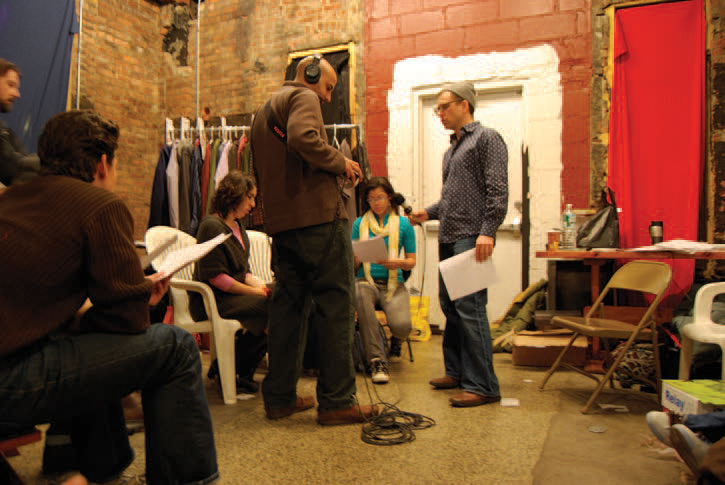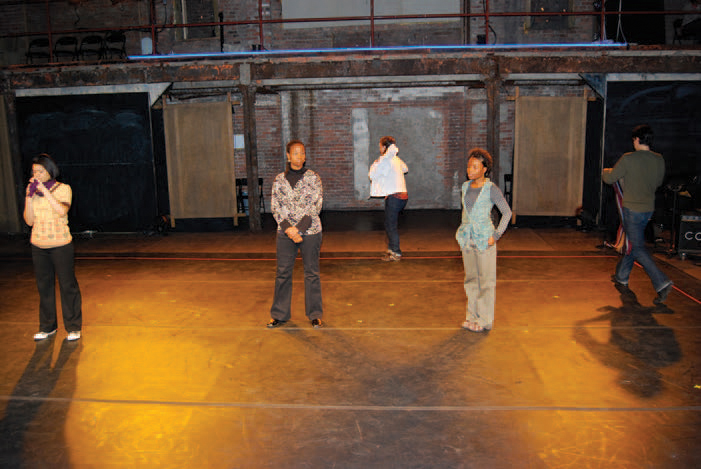The budget below shows the cost of developing a new play, from scratch, right up to its premiere at a regional theater. This particular play is by the Civilians, a New York–based theater company that specializes in investigative theater. The budget represents the cost of their unique brand of research, as well as the cost any theater company would incur commissioning and workshopping a script. In other words, this is the expense of producing enough of a play to attract funders.
The play, Brooklyn at Eye Level, is about the massive new Atlantic Yards development in Brooklyn. A team of actors gathered over 250 hours of interviews with Brooklyn residents, developers, politicians, and other stakeholders, taping their voices and noting their facial and physical idiosyncrasies. They performed the material to test it out, then they handed it over to a playwright, who created a script from the material.
This budget is divided into three parts: Investigation, Theater, and Development. Investigation is the cost of interviews and research. Theater is the cost of two weeks of writing and producing a sample play at a Lyceum theater. Development is the cost of commissioning and supporting the playwright.
This is an installment of Creative Accounting, an ongoing series that will show where the money goes for all of the major creative industries. Future issues will cover book publishing, television, fine art, and public sculpture. Eventually the series will be collected into a single, indispensable volume, published by Believer Books.
—Christopher Benz

INVESTIGATION $36,528
The Civilians had one month to collect information and begin rehearsing a play. They collected and transcribed over 250 hours of interviews, worked with local children, conducted research, and consulted experts. The figures below are four weeks of their weekly salaries.
Artistic staff $7,081
Artistic Director $1,500
Literary Associate $2,000
The Literary Associate collected research, identified key people to interview, and organized the interview process. Lit associates are “half stage manager, half dramaturg,” said Civilians Managing Director Marion Friedman.
Literary Assistant $81
Project Coordinator $2,700
Taxes $800
Artist Fees $23,711
Actors $13,000
Six actors recorded interviews.
Composer $1,600
The composer, Michael Friedman, wrote five songs using direct quotes from the interviews. This figure represents the first month of his $2,500 fee.
Lab Dramaturg $3,072
The dramaturg is almost a co-writer. He helped organize the 250 hours of interviews and vast amounts of other information into one eighty-minute play. This dramaturg was particularly talented, so the Civilians flew him from Ireland, the only real travel expense they paid. Pay below is the first month of his $2,500 fee.
pay $1,600
Air travel $617
Ground travel $55
lodging $800
Photographer $2,000
Urban Studies Student $1,200
This student helped put the interviews in the context of larger patterns, larger scales of influence, and the history of Brooklyn. Like almost every employee, she also gathered interviews.
Acting Interns $162
These three interns received metrocards.
Transcribing $2,677
Transcribers were paid hourly to transcribe tapes. Interviewers were responsible for transcribing parts of their interviews as well.
Occupancy $3,943
Office, Phone, Copying $1,650
Because of an agreement with funders, the Civilians can direct some project-specific funds toward their huge fixed costs. This money pays for part of the main office.
Rental Spaces $2,293
The Civilians rented a rehearsal space five days a week. They met three days a week to present excerpts from their interviews. The other two days, it was available for interviews or relaxation.
Technical $1,500
Web/Media Tech $1,500
Marketing $293
Postage $100
Letters, fliers and posters all travelled USPS.
Mailhouse $193
The mailhouse provided a bulk rate for postcards.
THEATER $71,154
After the investigation, the Civilians spent two weeks building a play with the best of the material. Extended question-and-answer sessions with community members followed each performance. The playwright incorporated this feedback into later versions of the play.
Artistic Staff $7,770
Artistic Director $1,950
Literary Associate $1,500
Project Coordinator $3,120
Evaluation Consultant $1,200
An outside consultant helped determine what parts of the performance worked and what needed adjustment.
Artist Fees $28,682
Director $2,560
Pay $2,000
Benefits $560
Assistant Director $600
Choreographers/Dancers $4,500
Brooklyn-based Urban Bushwomen dance company collaborated on this play. The Civilians paid the choreographer, who divided it up between her dancers.
Community Lab $2,750
Some performers taught a weekly workshop for children at a housing project, which was just a block away from the Atlantic Yards development. The children wrote songs, plays, poems, and stories. Two of the students performed their work in the Lyceum production.
Lab artist 1 $2,000
lab artist 2 $750
Composer $900
Lab Dramaturg $900
Actors $7,312
Musicians $1,750
Specifically, Michael Hill’s New York City Blues Mob
Set Designer $800
Sound Designer $800
Costume Designer $800
Lighting Designer $800
Photographer $750
Photographs of the production found their way to the website and helped archive the show for future directors.
Graphic Designer $900
Designed ads for the production.
Technical $7,583
Stage Management $1,200
Assistant Stage Management $825
Web/Media Tech $500
Production Manager $1,500
Technical Director $500
Electricians $1,548
Operators $1,510
Production $8,681
Sets and Props $1,192
Costume Purchase $1,069
Lighting Materials $330
Lighting Rental $700
Sound Material $300
Sound Rental $1,000
Research Materials $84
Running Expenses $253
Transportation $735
A truck hauled the rented technical equipment.
Storage $544
This is one play’s share of the company storage unit.
Hospitality $193
Production Expense $2,280
Occupancy $8,650
Office, Phone, Copying $1,650
Rental Spaces $7,000
This is the cost of renting the Lyceum Theater.
Marketing $9,788
Video $4,000
Postage $400
Printing $1,471
Advertising $917
Press Relations $3,000
This is one project’s share of a recurring monthly contract with a PR firm.
DEVELOPMENT $62,347
Follow-up interviews $11,847
After the Lyceum production, the Civilians do follow-up interviews and continue their research.
Artistic Staff $7,022
These staffers determine what additional information the writer will require, and direct its collection.
Artistic Director $2,950
Literary Associate $937
Project Coordinator $3,135
Research and Transcription $2970
Actors $720
Actors, who have established contacts with sources, are paid hourly for follow-up interviews.
Photographer $1,250
Photographs will be important for later set-design, as well as to keep a record of the characters and area.
Transcribing $500
Web/Media Tech $500
Materials $1,855
Hospitality $50
Office, Phone, copying $1,160
Video editing $400
Postage $255
Disseminating a report on the project to funders.
Commission $10,000
Had the Civilians purchased a play instead of commissioning it, they would have had to pay royalties and paid for rights. From this point on, this budget reflects the costs that any commissioned play might incur.
Workshop One $12,500
After the playwright has written the script, she tests the play in workshops, until she is confident that her script will work on stage. Workshops are generally two weeks long.
Director $1,800
Pay $1,500
Benefits $300
Music Director $1000
Stage Manager $1000
Actors $6,000
Actors may read multiple parts in this workshop stage. Most of the first workshop involves reading from scripts to an industry audience. The playwright makes many changes during this process.
Dramaturg $500
Space Rental $2,000
Hospitality $200
Snacks, paper copying, misc.
Workshop Two $28,000
The second workshop may include production elements, such as lights, to show potential producers a more finished version.
Director $2,500
Pay $2,000
Benefits $500
Actors $7,500
This workshop has a more realistic number of actors.





